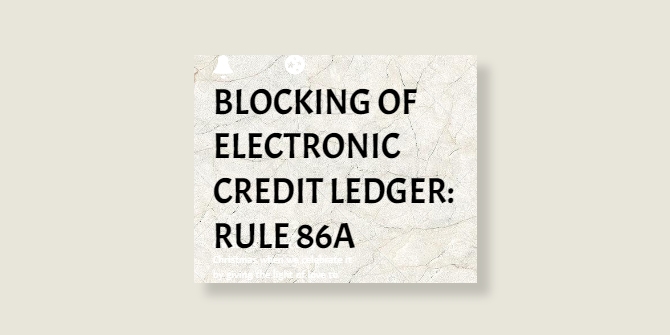Delhi HC holds that blocking of ITC in E-credit Ledger beyond one year is without the authority of law; ITC balance in ECL cannot be restricted on account of non-payment to the supplier
SUNNY JAIN Versus THE UNION OF INDIA ANR ORS. W.P.(C) 6444/2022, CM Nos.19502/2022 & 33763/2022
Facts
The petitioner is engaged in the business and supply of mobiles and mobile parts under the name ‘Mahavir Impex’. The allegation against the petitioner is that he had not paid the consideration for supplies received from D.G. Impex within the period of 180 days and therefore, was liable to pay interest under Section 16(2)(d) of the CGST Act.
In exercise of the power under Rule 86A of the CGST Rules, the respondents blocked the petitioner’s ITC lying in his ECR. More than 18 months were passed from the date when the ITC was blocked.
The petitioner challenged power exercised u/r 86A contending that the ITC can only be blocked where the ITC available in the ECR has been “fraudulently availed” or is “ineligible” as specified in the said Sub- Rule. There is no allegation that the petitioner has fraudulently availed the ITC lying to the petitioner’s credit in the ECR. Further, it was contended that blocking of ITC beyond one is without the authority of law.
High Court Ruling
- Hon’ble HC remarks that expression “inasmuch as” restricts the scope of ineligibility to the conditions as set out in sub clauses of Rule 86A(1) of the CGST Rules. It is only if any of the conditions of Rule 86A are satisfied then the restriction under such Rule 86A(1) can be imposed in respect of ITC on the ground that the ITC available in the taxpayer’s ECL is ‘ineligible’.
- A conjoint reading of Rule 37 of the CGST Rules and the proviso to Section 16(2) of the CGST Act leaves no room for doubt that a taxpayer is entitled to avail of ITC in the first instance even though he has not paid the supplier for the goods/services. He has to, however, reverse the same with interest by including the amount of
ITC availed as a part of his output liability, if he does not make the payment to the supplier within the stipulated period of 180 days. - Hon’ble HC remarks that the respondents have completely misdirected themselves in proceeding on the basis that unless a taxpayer pays the supplier, he is ineligible to avail of the ITC lying to his credit in the ECL.
- Hon’ble HC emphasizes that in terms of Rule 86A(3) of the CGST Rules, the restrictions imposed under Rule 86A of the CGST Rules cannot extend beyond the period of one year from the date of imposing such restriction.
- Hon’ble HC holds that the action of the respondents to continue blocking the ITC available in the ECR of the petitioner for such extended period is without the authority of law. revenue was directed to unblock the E-credit ledger of the petitioner.
- It was further clarified that nothing stated in the order would preclude the respondents from taking such steps as are necessary for recovering any ITC along with interest from the assessee, if the same is otherwise required to be added to the petitioner’s output liability in terms of the second proviso to Section 16 of the CGST Act.
AASK Legal comments:
GST is a self assessment based regime where duty has been casted upon the taxpayers to correctly determine the tax and deposit the same with the government. However, immense powers have been provided to the tax officers to put various restrictions over the taxpayers in order to safeguard the interest of revenue. Therefore, when such power is used without any caution, then the objective of the self assessment regime stands defeated. One of such powers is the authority to block ITC ledger under rule 86A of the CGST Rules. Blocking of an ITC in the ECR of a taxpayer, effectively prevents him from using the ITC for discharge of his liabilities. It is a drastic measure and therefore, can be taken only when the conditions for taking such measures are met. It would be pertinent to note that HCs in various judgments in the GST regime have held that the Departments shall exercise their power with extreme care and caution. It is expected that such powers are judicially and cautiously exercised by the revenue authorities.
Click herein below to download the copy of the judgment
TS-659-HCDEL-2022-GST-SUNNY_JAIN_idt
